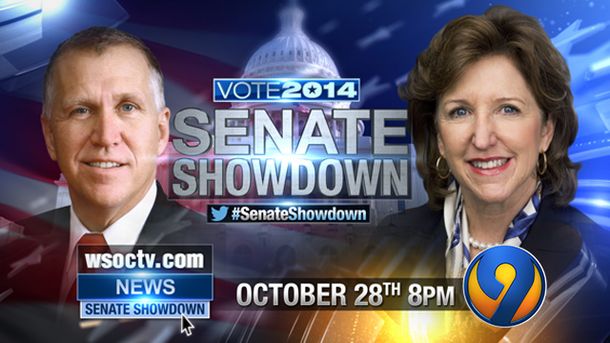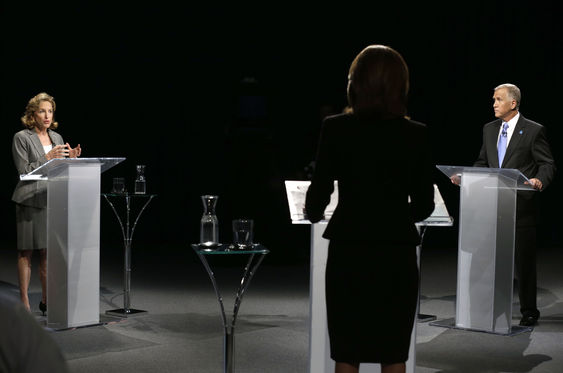Thom Tillis’ Tea Party extremism on display in North Carolina debate
North Carolina’s debate between Speaker Thom Tillis and Senator Kay Hagan didn’t look any different from the dozens of political battles being fought all throughout America.
The Republican eagerly sought to tie his opponent to a President with middling approval ratings while slamming Obamacare and promising repeal. The Democrat, was eager to downplay her common causes with the President and turn the attention to her opponent’s record on social issues.
The usual rhetorical pleas of “Why can’t we see some actual bipartisanship for a change?” and “It’s time to send someone to clean up the mess in Washington,” though Tillis ramped it up a notch by declaring, “I’ll go there, get things done, and make America great again.”
Make America great again?

That might be the loftiest goal announced by any single candidate in the 2014 midterms so far. (Side question for all his fellow patriots: Can someone who aspires to make America great logically believe America is great already?) If Tillis can turn America’s troubles around as a freshman senator in a body of 100, I’ll tip my hat to him and reassess everything I thought I knew about politics.
But I wouldn’t count on it, for reasons that were on display last Wednesday night.
The first obstacle to Tillis’ aspirations of saving America is his own record. The Speaker of North Carolina’s House of Representatives has had the chance to make his vision for the state into a reality after his party seized total control of the state government in the 2012 elections. It was the first time since Reconstruction that Republicans held all the cards in the state capital, and sure enough, big changes were afoot.
In politics nothing can be crueler than ideologues with sudden power, and the agenda of these state lawmakers who have only just broken out of a political exile lasting more than a century has been cruel in the extreme. It’s an agenda that’s already sparked massive backlash that’s taken the form of Moral Monday protests and a stunning 18-percent approval rating for the state legislature. That last point is significant; Tillis has managed to make the institution he presides over even more unpopular than Washington.
This is a legislature of Dementors, spreading a hopelessness throughout the state that is equal parts anguish and disgust. It’s visited financial hardship, humiliation, and even death on North Carolinians through its refusal to expand Medicaid for half a million of the state’s residents. It enacted savage cuts to the state’s unemployment insurance programs, making the difficult times faced by 170,000 citizens even more challenging while forcing these recipients to take drug tests or forfeit the assistance that remained. It gave North Carolina the distinction of becoming the only state in history to roll back the Earned Income Tax Credit, taking money out of the pockets of its poorest citizens, even as they passed tax breaks for millionaires.
It’s not a record that Tillis can run on to win a statewide general election, so he’s eager to change the subject to a more comfortable topic: slamming national Democrats and driving home the message that Kay Hagan is a partner with Obama. That’s typical enough in the Republican playbook this year, and I don’t dismiss the tactic on any strategic grounds: It may well be enough for them to win the Senate with 2014’s political map.

But the manner in which Tillis confronted Hagan smacked of a culturally dismissive attitude that might have been commonplace in the 1980s, when George H.W. Bush condescendingly lectured Geraldine Ferraro on the difference between Iran and Lebanon in a debate, but no longer flies with voters today. For starters, the business of constantly referring to the U.S. Senator as “Kay” was rude. Throughout the hour-long debate, she consistently referred to her opponent as “Speaker Tillis.”
Why couldn’t he have shown her the same courtesy?
Then the eyebrow-raising comment, to say the least was this, “Kay’s math just doesn’t add up,” Tillis claimed while explaining how his legislature’s $500 million cuts to education did add up. Later on, he pointed to the pay increases his legislature have voted to give to the state’s teachers, saying, “A seven-percent pay increase, that’s reality, and that’s math, and that’s something Kay needs to accept.”
It was insulting to the former banker and state lawmaker, who noted in her retort that she’d managed billion-dollar budgets. To Hagan’s credit, she called him out for the insult, right before she swatted away his subsequent charge that she’d idled away on veterans’ affairs by listing the sweeping bipartisan reforms she’d passed with the state’s other senator to give their veterans the care they deserved.
It was an incredible political TV moment as she listed all of the measures she’d taken since her first day in office to help America’s veterans, perhaps resisting the urge to smile as she ticked them off one-by-one. Most memorable of all was Tillis’ lame reply: “Well I think, in this instance, Kay may have done her job.”
The sight of a man deriding a female opponent as numerically illiterate isn’t something that will endear Tillis to his state’s moderate voters. As recent elections have shown, North Carolina has come a long way since being the state that elected and reelected Jesse Helms to the Senate, a man so avowedly racist he took pleasure in whistling the old Confederate song “Dixie” while standing next to the African-American senator Carol Mosley-Braun. Now it’s a purple state that’s trending bluer every cycle, as thousands of people from out-of-state have relocated to the urban area dubbed the Research Triangle, in search of jobs in the banking and tech sectors.

As it happens, this transformation of North Carolina’s politics hasn’t been lost on Tillis. In a 2012 interview, he told the Carolina Business Review that the state’s “traditional population” was shrinking as the percentage of minority voters in the electorate climbed ever-higher. It’s caused a minor flap, but Tillis’ remark—labeling white citizens as the “traditional population”—underscores a tendency that more and more Republicans seem to be guilty of, but which Tillis has crafted into a political modus operandi in North Carolina. He approaches electoral coalitions not with addition but with subtraction, writing off significant swaths of the electorate while acting as though the only voters in the state are those in the GOP base.
With a rubber-stamp legislature and a complaint governor, he has pursued every item on the far-rights checklist. Tillis and his allies have defunded Planned Parenthood, embraced fracking, slashed domestic spending for the state’s most vulnerable, eliminated the state’s campaign finance reforms, and through a series of tax hikes and tax cuts, redistributed wealth from North Carolina’s poorest citizens to its richest. Most tellingly of all, Tillis has made it harder to vote, cutting the state’s early voting days from 17 to 10, while eliminating the “Souls to the Polls” voting weekend that black churches have historically used to galvanize their followers with rides to the polls after sermons. It’s a move that tells North Carolinians all they need to know about the man who would be their next senator. He’ll call himself a uniter, but his real strategy is to remove his opponents from the equation.
National Implications Beyond Senate Control
North Carolina’s Senate race this year has been the most expensive in the state’s history, with the combined expenditures of both sides totaling more than $30 million. For a state with only one expensive media market, that’s an incredible figure—but then, the stakes are high.
With three Democratic-held seats virtually assured of turning over while four more teeter on the brink, North Carolina could very well be the tipping point in the battle for Congress—the race that grants or denies the GOP’s bid to take over the Upper Chamber. But there’s even more to it than that.

Tillis is seeking a promotion after transforming his state government into a right-wing lab experiment. He’s earned heavy disapproval for having done so. But he may get away with it even in a moderate state, if midterm turnout is low enough that a flood of angry, far-right voters overwhelms the state’s changing demographics and pushes Tillis to the finish line. The message will be clear to wavering Republicans in other moderate states like Michigan, Ohio, Iowa, and elsewhere: I radicalized. I thrived. So can you.
Tillis has been the architect of a far-right swing in his state that’s as unpopular as it’s been devastating. Given his approval ratings, North Carolinians know it. And yet, he could still win.
If these ideologues have their way, Tillis will be sent to Washington to replicate what he’s done in North Carolina on a national scale. He’ll be a one-man brigade of Tea Party reinforcements to bolster the Ted Cruz wing of Senate flamethrowers, brought about by a successful testing ground in North Carolina. That’s hardly the sort of incubator most of North Carolina’s citizens want their state to be.
But there’s one sure-fire way to stop him, and the scores of others just like him all over the country: vote.
The outraged majority of North Carolinians can defy historical midterm habits and head to the polls this November. And if that happens, North Carolina’s political story can have a very different ending. It can be the state that took far-right extremism out for a spin, saw the consequences, and when offered a national deal gave a reply that changed 2014’s entire narrative: “Thanks, but no thanks.”
William Dahl is a recent graduate of The College of William and Mary, where he majored in Government and studied abroad in La Plata, Argentina. He has worked for community foundations in Argentina and Miami dedicated to community engagement and prosecution for human rights abuses. A native Virginian, he moved to Baltimore in 2013 to join a financial research firm, where he enjoys being able to write on the side.

